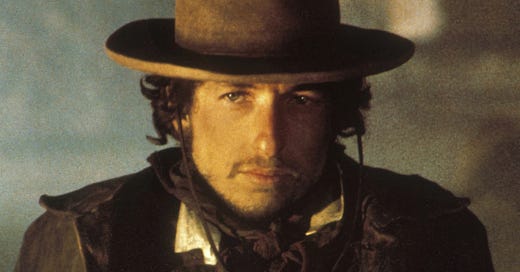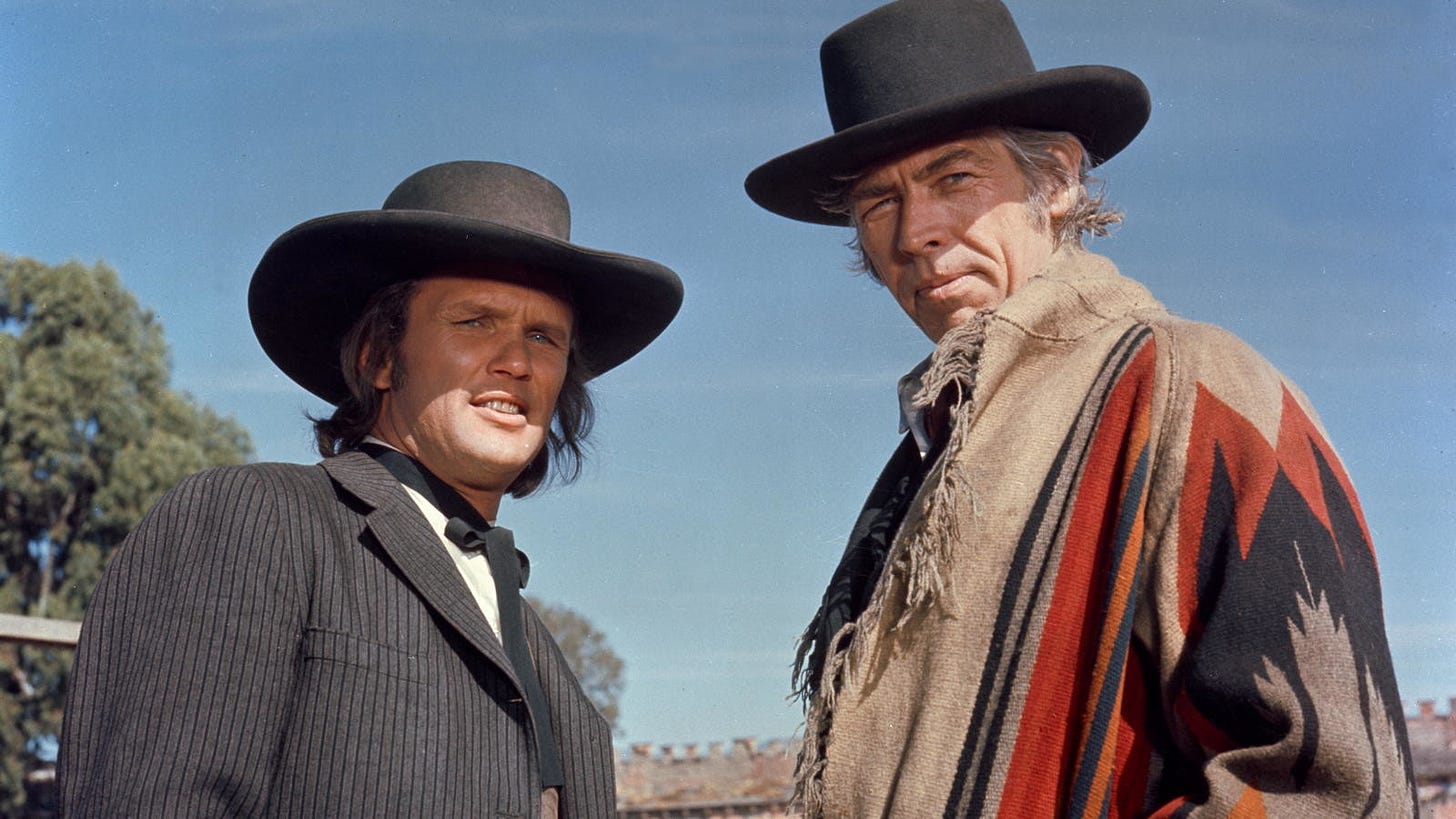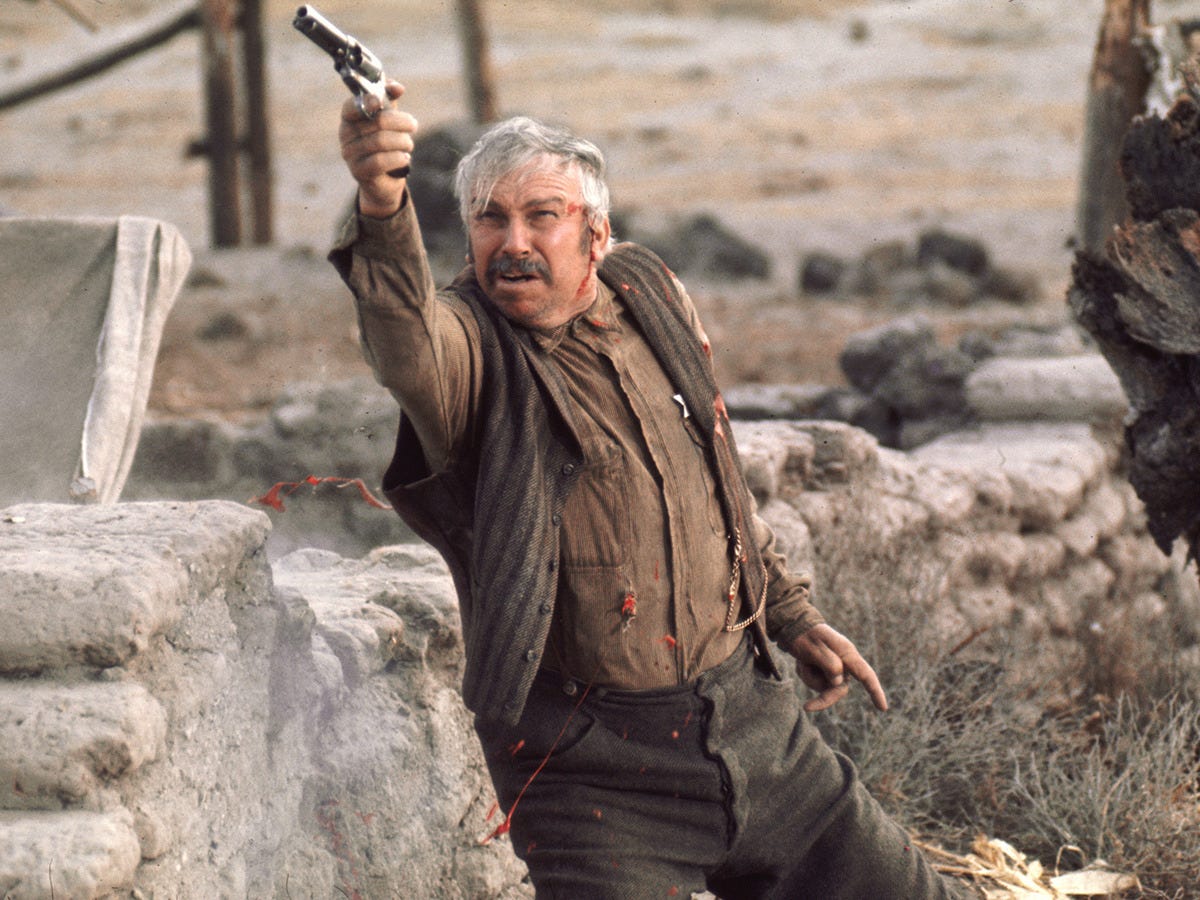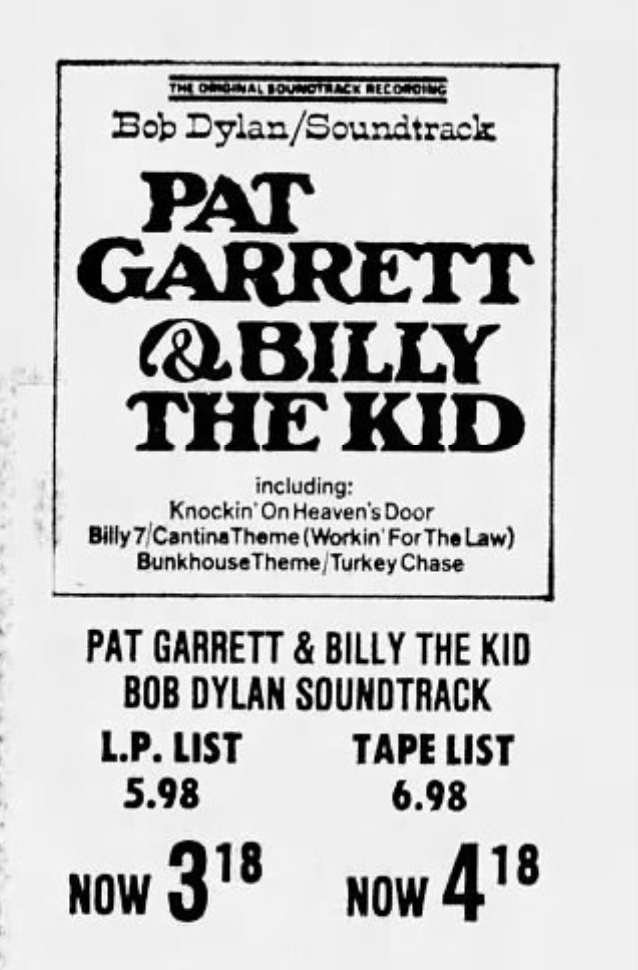When Dylan Met Peckinpah
Bob Dylan’s soundtrack to Sam Peckinpah’s autumnal western contains a classic song Dylan almost didn’t write for a movie that kept threatening to fall apart with or without it.
Stories involving Sam Peckinpah or Bob Dylan tend to exist in multiple, often conflicting versions. It makes sense, then, that no one can quite agree on the details of their only collaboration, the 1973 western Pat Garrett and Billy the Kid. In his book Revolution in the Air: The Songs of Bob Dylan 1957-1973, Dylan biographer Clinton Heylin quotes James Coburn recalling the first meeting between Dylan and Peckinpah during pre-production on Pat Garrett and Billy the Kid as a kind of love at first sight. Though Peckinpah had never heard of Dylan, the director listened to him perform a few songs, including a ballad inspired by Rudy Wurlitzer’s script for the film, and exclaimed “Who is that kid? Sign him up!”
Yet in an audio commentary recorded for the new Criterion Collection edition of the film, Roger Spottiswoode, who served as one of the film’s editors, tactfully refers to the two having “a complicated relationship” before adding “Sam actually didn’t want him there.” Spottiswoode then describes his memory of the time Dylan (whose name Peckinpah pronounced “dye-lin”) first met Peckinaph while the director was having a bath in the company of friends and an assistant tasked with “keeping his glass filled.” The uneasy introduction, in which Dylan only reluctantly performed for the presumably still wet, drunken Peckinpah, set the tone for what followed.
Both or neither could have happened. How do you print the legend when every version sounds like a legend?
The nebulousness extends to every aspect of the Peckinpah/Dylan collaboration. If the director felt like the singer had been forced on him, why does the film make such extensive use of Dylan’s music and give him a prominent supporting role in the film? If Peckinpah dug Dylan’s contributions so much, why, in the last cut of the film the director approved before MGM took it out of his hands (after threatening to take over the film throughout filming), did he choose only to use the instrumental passage of one of Dylan’s songs? It was a late addition that Dylan had not planned to write, a track requested by Peckinpah’s usual composer Jerry Fielding. Fielding then dismissed it as “shit,” an opinion that Peckinpah’s decision not to include it in full suggests he might have shared. That song? “Knockin’ on Heaven’s Door.”
“A western full of songs seemed a strange thing,” Spottiswoode says later in the commentary then adds, “I’ve come to like it but at the time, not just I but several people thought a song about knocking on heaven’s door played over somebody dying was a little on the nose.” In many respects, he’s not wrong. A recording artist providing a song score wasn’t exactly new in 1973. Pat Garrett & Billy the Kid arrived on the heels of The Graduate, Harold and Maude, and Superfly and the albums Dylan had released since turning toward spare folk and country in the latter half of the 1960s more easily suggested the Old West than his earlier work. But that didn’t make the Peckinpah/Dylan team-up an intuitive pairing. Neither created the kind of art that easily bent to meet a collaborator halfway. And, yes, the lyric of “Knockin’ on Heaven’s Door” does seem a bit on the nose, when you think about it.
That, however, requires thinking about it. The theatrical release of Pat Garrett and Billy the Kid uses the vocal version of “Knockin’ on Heaven’s Door” twice, as does the version Criterion has dubbed the “50th Anniversary Release,” a new cut assembled by Spottiswoode and editor Paul Seydor using elements of the theatrical cut, the version Peckinpah created for the film’s disastrous previews, and deleted scenes. Both scenes using the song—which can be found in full in both the theatrical and 50th anniversary cuts—create moments of overwhelming emotion, especially the first, when the aging Sheriff Baker (Slim Pickens) and his wife (Katy Jurado) accompany lawman Pat Garrett (James Coburn) as he confronts members of the gang led by Billy the Kid (Kris Kristofferson). The Bakers join Garrett reluctantly and though, as with all the violence in the film, Baker’s mortal wounding arrives swiftly and brutally, there’s a sense of inevitability to it. Like nearly every other character in the film—set, except for a prologue, entirely during the final few days of Billy’s life—they’ve been on a death trip from the first time they appear.
As Baker wanders to a nearby pond to die, the film slows to match the tempo of Dylan’s song. While Dylan sings “Mama take this badge off of me / I can’t use it anymore,” the sheriff clutches his wound and the Bakers exchange a final, knowing exchange. The words literally describe the action and yet it’s among the film’s most poetic moments. The on-the-noseness, so at odds with Dylan’s usual approach to lyrics, doesn’t matter. Some events need only a spare description. In its current form, it’s easy to agree with the assessment Spottiswoode recalls Kristofferson delivering at the time: “I think this is the greatest cue I’ve ever heard in a movie.”
Or at least it’s easy to see that now. The film earned mostly unkind reviews on its way to box office failure. Released months after the film had come and gone, Dylan’s soundtrack album, like most of his work from this period, also met with a lot of critical skepticism. “Knockin’ on Heaven’s Door", however, became Dylan’s first hit since “Lay Lady Lay” in 1969 and inspired covers by, among others, Eric Clapton and Guns n’ Roses (who took to performing it live and recorded a version for the Days of Thunder soundtrack). Dylan hasn’t performed the song, once a live staple, since 2003, but he hasn’t really needed to. It’s taken on a life of its own.
Maybe it’s easier to appreciate Pat Garrett and Billy the Kid, and Dylan’s contributions to it, now. Time has made clearer what the movie is: a collection of rough edges and misfit pieces made by an all-time great director in the act of destroying his body and career that comes close to cohering into a masterpiece anyway. Scenes that don’t work or whose role in the film seem unclear butt up against some of the greatest of Peckinpah’s career, particularly a haunting finale that somehow finds a way to depict the death of the American frontier. It looks nothing like the end of The Wild Bunch, creating a gutting sense of finality all its own.
A western full of songs might be a strange thing, but Pat Garrett and Billy the Kid is full of strange things, including its call sheet. Kristofferson’s casting as the pitiless killer calls attention to itself, as does the casting of singer and Kristofferson’s then-girlfriend Rita Coolidge. These were faces that turned up in Rolling Stone more often than The Hollywood Reporter. But there’s a self-awareness to the rest of the film’s casting, too. In addition to Pickens and Jurado, there’s scarcely a face in the film that wouldn’t have been familiar to 1973 moviegoers from decades of westerns, both those made by Peckinaph and others: Jason Robards, Jack Elam, L.Q. Jones, Elisha Cook Jr., Barry Sullivan, Chill Wills. It’s almost as if Peckinpah wanted to make sure viewers forgot they were watching a movie, whether they were looking at rock stars putting on spurs for the first time or veterans making another late-career return to the saddle.
Then, usually on the margins, there’s Dylan himself. Sometimes he’s onscreen as the mysterious printer’s assistant known as “Alias.” (Asked by Garrett who he is, he replies, “That’s a good question.”) Sometimes he’s on the soundtrack, singing one of the many lyrically overlapping verses of “Billy,” the song he composed for the film inspired in part by the ballads that helped make Billy the Kid a folkloric hero after his death. You can’t see or hear him without remembering he’s Bob Dylan. Yet he fits right into the film’s world.
Years later, Richard Gere would play an aging Billy the Kid as one of the Dylan incarnations in Todd Haynes’ phantasmagoric sort-of biopic I’m Not There. It’s as if Peckinpah’s film had just kept rolling and Dylan and Alias and Billy had merged into one, as if Peckinpah drew Dylan into the world of American myth and he’d gotten stuck there. Or, looked at another way, with Peckinpah, Dylan helped bring to life what Greil Marcus, writing about Dylan’s Basement Tapes years later, called “the Old, Weird America.” It’s a dusty place of junk shops, faded lithographs, and songs born of half-remembered stories where the American identity was formed and where, maybe, it could still be reshaped. It’s not that Dylan never left Peckinpah’s battered, brutal, beautiful frontier. It’s that Peckinpah showed him the place he’d been living all along.








This feels like as good a place as any to get on my soapboax about "revisionist" Westerns, and the Westerns of the 60s and 70s more generally, including Peckinpah. During the pandemic, my partner--who, once she gets into something, *really* gets into it--watched something like 70 or 80 Westerns: the Fords, the Ranowns, the Anthony Manns, the Leones, the Corbuccis, you name them. My observation is that the Westerns following WWII are *already* revisionist--very clearly influenced by the Holocaust in their treatment of the interactions between settlers and Native Americans, very aware of the human cost of violence, and extremely interested in the dialectic (sorry! but it's really the right word!) of barbarism and civilization. John Wayne, for example, who we think of as unreflected Americanism incarnate, usually plays a war veteran who has spent time among the Indians and speaks their language, and so often a humane mediator between "civilization" and "the barbarians," or the male and female worlds in Ford's cavalry Westerns. What makes that era of Western so good is that the moves are aware of the ideological freight that the genre carries and know how to bring it out subtly, and make it work with and against the mythic power of the imagery. When loveable codger Walter Brennan is playing the villain in My Darling Clementine, you know something is very wrong.
The more self-consciously revisionist Westerns of the late 60s and 70s--I'd include Leone in this, but he's such a master visual storyteller it doesn't matter--don't have the same ideological investment in the themes and concepts that made the Western so powerful for so long, and so to me they often seemed kind of boring and nihilistic. They didn't really "subvert" expectations because the filmmakers obviously didn't have any investment to begin with, and so the movies are kind of slack. Probably the last great Western here is The Wild Bunch, which leaves its mark because it's basically one of the first modern action movies, and invented a new, super kinetic visual language. But watching High Plains Drifter which *opens* with Clint Eastwood raping a woman, I don't know, it feels like at that point there's just no tradition left to work with to put formal pressure on the whole thing and make the choices really matter.
I'm Kent Brockman, and this has been...my two cents.
This is just a piece of damn poetry, thank you very much.